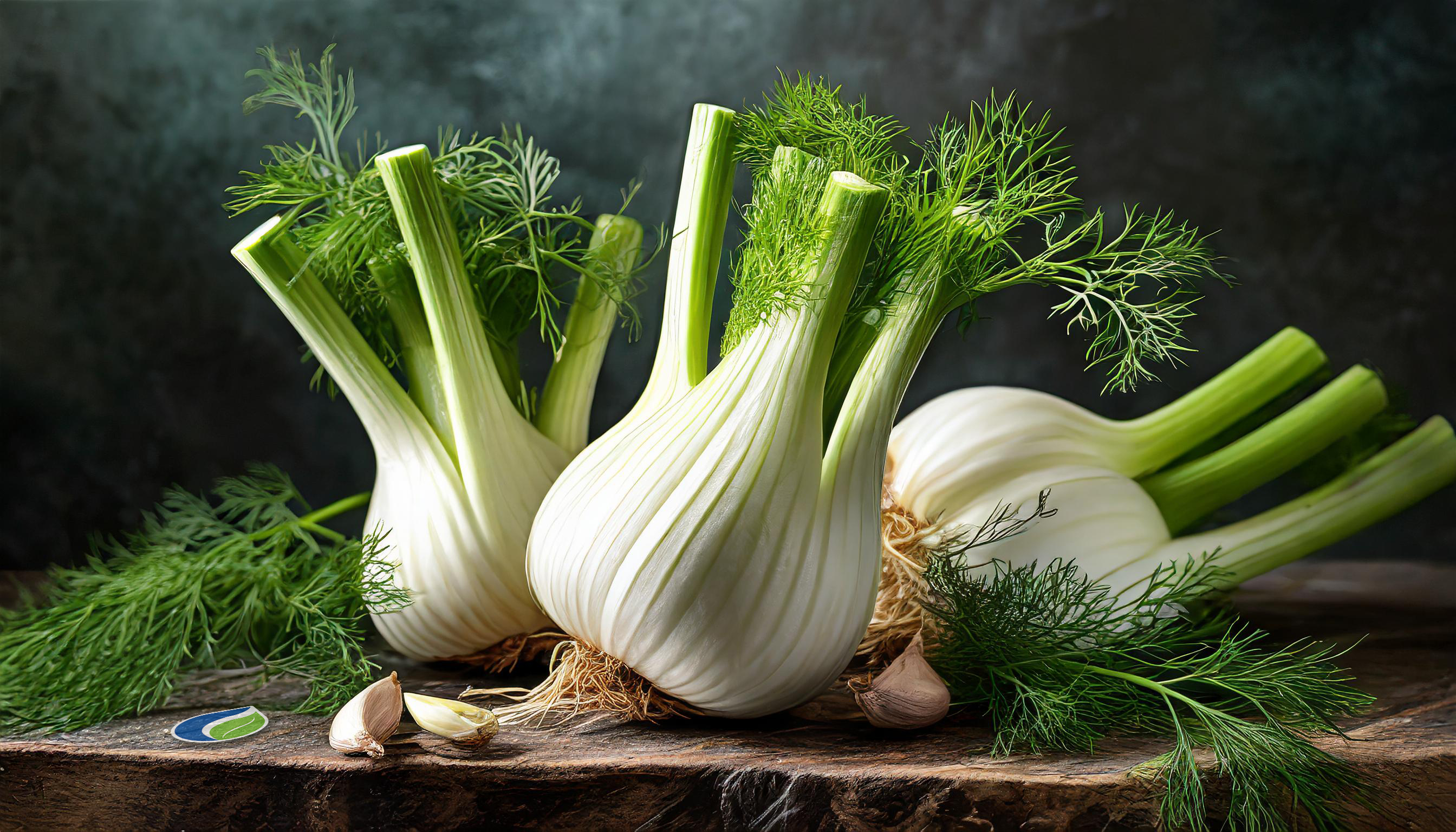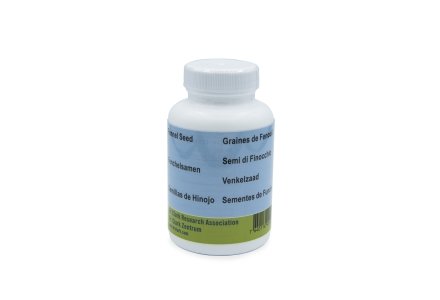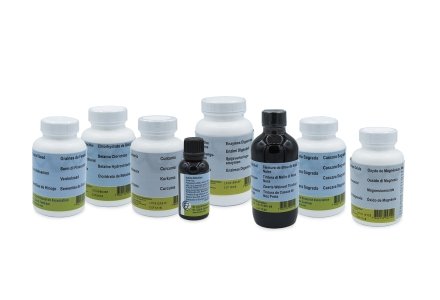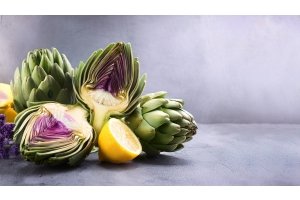
Welcome to this extensive blog about fennel. In this blog we take a closer look at the nutritional value of fennel and successively the effect of fennel on digestion, its anti-inflammatory properties, fennel and breathing, and the antioxidants that fennel contains. We also mention that fennel can be used as a natural remedy for menstrual pain. Finally, we describe how to integrate fennel into a diet and address some questions in the FAQ. Let's start the journey of discovery together into the versatile possibilities of this wonder tuber.
The nutritional value of fennel: what is in it?
Fennel is a plant species from the lacecap family (Apiaceae). Fennel was originally found only in the Mediterranean region, but is now grown worldwide for its edible tuber, leaves and seeds. Fennel has a sweet, licorice-like taste and is widely used in cooking. Fennel is also valued for its medicinal properties and is used in traditional medicine for a variety of purposes, including promoting digestive and respiratory health and as a natural remedy for menstrual pain.
Fennel is a nutritious vegetable with a number of important nutrients. Here are some of the nutrients found in fennel:
Fiber: Fennel contains fiber that is important for healthy digestion and promoting a healthy intestinal tract.
Vitamin C: This antioxidant helps strengthen the immune system and plays a role in collagen production, which is important for skin and connective tissue health.
Potassium: A mineral essential for heart health and blood pressure regulation.
Folic acid (vitamin B9): Important for the production of red blood cells and in the development of fetuses during pregnancy.
Magnesium: This mineral is involved in more than 300 enzymatic processes in the body and plays a role in muscle function, nerve function and blood sugar regulation.
Calcium: Essential for healthy bones and teeth, as well as for muscle function and the transmission of nerve signals.
Vitamin K: Important for blood clotting and maintaining healthy bones.
Phytonutrients: Fennel contains several phytonutrients, such as flavonoids and phenolic compounds, which are known for their antioxidant and anti-inflammatory properties.
Fennel and digestion: a natural digestive
Fennel is known for its beneficial effects on digestion and has been used for centuries for its medicinal properties related to digestion. Here are some ways fennel can support digestion:
Relief from digestive problems: Fennel has been traditionally used as a natural remedy for digestive problems such as indigestion, flatulence and bloating. The volatile oils in fennel, such as anethole, can help relax the muscles in the digestive tract, reducing gas and relieving digestive cramps.
Stimulating digestion: Fennel can promote digestion by stimulating the production of digestive enzymes, which can aid in the breakdown and digestion of food. This can lead to more efficient digestion and a reduced risk of indigestion.
Improving intestinal health: The fiber in fennel contributes to healthy intestinal flora by promoting the growth of beneficial bacteria in the intestines. Healthy intestinal flora is essential for good digestion and a strong immune system.
Anti-inflammatory properties of fennel
Fennel is known for its anti-inflammatory properties, which are mainly due to the presence of several bioactive compounds, including phenolic compounds, flavonoids and volatile oils such as anethole. Below is a brief summary of why fennel may provide anti-inflammatory benefits:
Phytonutrients: Fennel contains a variety of phytonutrients, such as flavonoids, which are known for their powerful antioxidant properties. These compounds can reduce oxidative stress and inhibit inflammatory processes in the body.
Phenolic Compounds: Fennel contains phenolic compounds such as rosmarinic acid and caffeic acid, which have anti-inflammatory properties. They can inhibit inflammatory responses in the body by reducing the production of pro-inflammatory molecules.
Volatile oils: The volatile oils in fennel, especially anethole, also have anti-inflammatory properties. Anethole can inhibit inflammatory responses by inhibiting certain enzymes and signaling pathways involved in inflammatory processes.
Gastrointestinal inflammation: Fennel is sometimes used to relieve gastrointestinal inflammation, such as in digestive disorders and irritable bowel syndrome (IBS). Fennel's anti-inflammatory properties may help reduce inflammation in the gastrointestinal tract, which can lead to relief from symptoms such as abdominal pain and discomfort.
General anti-inflammatory effects: By regularly consuming fennel, its anti-inflammatory properties can help reduce inflammation throughout the body, which can be beneficial for overall health and well-being.
It is important to note that although fennel has anti-inflammatory properties, it should not be seen as a substitute for medical treatments for serious inflammatory conditions. However, it can be a valuable addition to a healthy diet and lifestyle for promoting anti-inflammatory effects in the body.
Fennel for respiratory health
Fennel may be beneficial for respiratory health due to its various properties and nutrients, including the anti-inflammatory properties mentioned earlier. In addition, there are some other ways fennel can support respiratory health:
Expectorants: Fennel is traditionally used as a natural expectorant, meaning it can help loosen and expel mucus from the airways. This can be especially useful for conditions such as colds, flu and bronchitis, where mucus build-up in the airways can lead to coughing and shortness of breath.
Antibacterial properties: The volatile oils in fennel, such as anethole, have antibacterial properties that can help fight bacterial infections in the respiratory tract. This can be especially beneficial for infections such as sinusitis and strep throat.
Relief from cough and sore throat: Due to its calming and soothing properties, fennel tea or syrup can provide relief from cough and sore throat. It can help soothe irritated throat mucous membranes and reduce coughing.
Antioxidants: Fennel is rich in antioxidants such as vitamin C and flavonoids, which can help neutralize free radicals in the respiratory tract. We will discuss the antioxidants in fennel in more detail in the next section.
Antioxidants in fennel: protection at the cellular level
Fennel provides protection at the cellular level due to the presence of antioxidants in the plant. Antioxidants are compounds that neutralize free radicals and reduce oxidative stress, thereby protecting cells from damage. Oxidative stress occurs when there is an imbalance between the production of free radicals and the body's ability to neutralize them with antioxidants. This can lead to cell damage and the onset of various diseases. The antioxidants in fennel help reduce oxidative stress and thus protect cells from damage. By reducing oxidative damage, antioxidants in fennel can help slow the aging process at the cellular level, which can contribute to healthier skin, slowed cell aging and a reduced risk of age-related diseases.
This could also potentially help reduce the risk of chronic diseases.
Fennel as a natural remedy for menstrual pain
Traditionally, fennel has also been used as a natural remedy for menstrual pain due to its antispasmodic and anti-inflammatory properties. Fennel contains volatile oils, including anethole, which have antispasmodic properties. These compounds can help relax the muscles in the uterus, which relieves cramps that occur during menstruation. Fennel's anti-inflammatory properties can also help reduce inflammation in the uterus and surrounding tissues, which can reduce the severity of menstrual pain. Finally, some studies suggest that fennel contains phytoestrogens, compounds similar to the female hormone estrogen. These phytoestrogens can help regulate hormonal imbalances that can cause menstrual pain.
How do you integrate fennel into the daily diet?
There are several ways to incorporate fennel into your daily diet, listed below:
Fennel in meals: Add fennel to salads, soups, stews, stir-fries and side dishes. You can cut fennel raw and add it to salads for a crispy texture and fresh flavor, or bake, stew or roast it for a more pronounced flavor.
Fennel Tea: Fennel tea is a popular drink used for its relaxing and digestive properties. You can make fennel tea by steeping fennel seeds in hot water for a few minutes. You can add honey to improve the taste.
Fennel Seed: Fennel seed can be used as a spice in many variations in meals. You can grind it into a fine powder and add it to curries, stews, sauces and marinades. You can also add whole fennel seeds to breads, pastries and cookies for a subtle aniseed flavor.
Fennel Oil: Fennel oil is often used for aromatherapy and can be vaporized in a diffuser to create a soothing atmosphere. It can also be diluted with a carrier oil and applied topically to the skin for relief from digestive complaints or muscle pain.
Fennel Supplements: Fennel supplements are available in several forms, including capsules, regimens, tablets and liquid extracts. These supplements can be taken to supplement your daily diet, especially if you have difficulty incorporating fennel into your meals in other ways. Make sure you purchase fennel supplements from a reputable source and follow the label directions.
Meditech Europe is ready to advise and guide you in discovering the world of nutritional supplements and offers fennel seed as a nutritional supplement in the form of capsules. You can contact us via info@meditecheurope.nl or +31527 292 331.
FAQ
Can I eat all parts of the fennel plant?
You can eat all parts of the fennel plant. The tuber, leaves, stems and seeds can be used in various dishes. The tuber can be eaten raw or cooked, the leaves can be used as an herb, the stems as a vegetable, and the seeds as a spice or for making fennel tea.
How can fennel help my digestion?
Fennel may aid digestion due to its antispasmodic properties, which relax the muscles in the digestive tract, reducing gas and cramps. In addition, fennel seeds contain fiber that promotes digestion and helps with healthy intestinal flora.
Is Fennel Safe for Everyone to Consume?
In general, fennel is considered safe for most people when used normally in food. However, individuals with an allergy to plants in the celery family, such as celery, parsley or carrots, may also experience an allergic reaction to fennel. Pregnant women should be cautious about consuming fennel in large quantities due to its phytoestrogen content, although moderate consumption is generally considered safe. For individuals with specific medical conditions or when in doubt, it is advisable to seek medical advice before consuming fennel.






